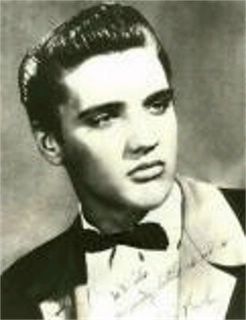Elvis' Enduring Talent

Elvis Aaron Presley - "It was like he came down from Mars" - Nick Ciampi 
I was listening to "Elvis At Sun" tonight. What an enormous talent Presley was. It is eas to denigrate the King in his rotund final days. The rumors of his untimely but inevitable demise on the throne helps matters very little.
However he may have passed, his coming and his existence was heavy indeed. I was particularly taken by "Harbor Lights." I have heard Willie's version many times but one listen to Elvis' version made me believe that this was his song.
Elvis was one of those artists who represeted the confluence of many of the tributaries of the river of song. David Byrne, Merle Haggard, and Jerry Garcia are a few other artists who essentially distill other traditions and styles of music into their own. As such, these are the artists that move things forward. They are the antithesis of the conservatory. They are revolutionary forces that propel music forward.
When Elvis Hit the scene, Perry Como was at the top of the pops with "Hot Diggity (Zog Diggity Boom)." Presley's first single was "That's Alright Mama" and it was a universe away from "Hot Diggity." Pressley was all hips and sneer and Como was in a cardigan, a grown-up, wholesome letterman to Presley's Mephistopolean sexual time bomb.
Yet Elvis' croon was so delicate and tender, what was there not to like. Surely, har "Harbor Lights" been his first single, it would have been a whole different revolution. Fortunately, history takes its own path and we are left to deal with it. As it was, Elvis' first single rocked the world. The Memphis-Hip-Swinging Other had landed and the reverberations would continue to be felt forever.
What happened to Elvis is nothing short of tragic. The Col. and the Dr. would keep him from taking chances just long enough to turn him into a commodity. He was no longer Glady and Vernon's kid, he belonged to the fans and he had to walk the straight and narrow artistically in order to keep the fans. At least this is what the Col. told him.
There were no European tours. There were no good movies. Elvis was kept from taking Kristopherson's part in "A Star Is Born" because the movie didn't project Elvis values. There were some flashes of brilliance, like the "'68 Comeback Special," but by and large, Elvis, like Johnny Cash, labored under the burden of his persona. He ceased to evolve as an artist because he had to be Elvis. Unfortunately, the was no Cash-like rennaisance becasue Elvis died young.
Imagine what Rick Rubin could have done with him.
[+/-] read/hide this post
Hunter S Thompson – 7/18/37 – 2/20/05 Father Of Gonzo Journalist, Free-Thinker, Incisive Cultural Critic
Journalist Hunter S. Thompson passed away on the 20th of February, 2005 at his compound in Woody Creek, Co. He was 67 years old. Reports indicate that he perished from a self-inflicted gunshot wound. It was an abrupt but strangely fitting end to the life and career of a man who created Gonzo Journalism, where the writer becomes deeply intertwined with the subject and reports from that very unique perspective. His most famous work, “Fear and Loathing In Las Vegas,” began with the line “We were somewhere around Barstow on the edge of the desert when the drugs began to take hold.”
To most of the straight-laced world, he was the embodiment of the seven deadly sins. Thompson was an incoherent, babbling lunatic with a penchant for firearms, firewater, and narcotics. He represented all that was wrong with the 60’s and he served as a reminder that the collision of dangerous excess and wanton self-indulgence is seldom a pretty sight to behold. To parents who happened to read that first sentence of their children’s copy of “Fear and Loathing in Las Vegas” he was a cloven-hooved corrupter of youth; a modern-day Socrates in shooting glasses carrying a typewriter with the everpresent Dunhill hanging from a cigarette holder in the right corner of his mouth.
He was no choirboy; he was known to start his days with a bloody mary or a shot of chivas regal and a joint or a line of cocaine. He was active and an outdoorsman but he was not a picture of health or a model sextagenarian.
However, he was a writer of incisive wit who had a deep grasp for the finer points of politics, sport, and culture. His command of language, both the formal and the vernacular, gave his work a level of depth that is seldom found in journalism or cultural criticism and his political writing was always informative and entertaining. He laced is articles with quotes from diverse sources such as Tennyson, Bob Dylan, and the Book of Revelation. He always had a sense of the bigger picture and had a knack for bizarrely concise and fitting analogies that gave hive work a rare intellectual weight.
Thompson lived like a Viking. He was a marauder who lived like there was no tomorrow. This strange “Viking” pathology is something that I have seen before in other friends who took their own lives. The act of suicide, although it is a powerful final statement, often raises more questions that it can ever possibly answer. One can glean from his appearance in recent photographs that his life was beginning to take its toll on him. Whatever the case, he felt inclined to write his own ending to his life and took the liberty to do so. Thus, it was his final act of excess and self-indulgence and a strangely fitting end to his career.
I will remember Hunter S. Thompson as the articulate defender of truth, justice, and the American way. It was Thompson’s voice more than any other that stirred my spirit and made me want to be a writer. His unique viewpoint was as singular as his literary influences and he made me realize that even something as banal as the superbowl or a sheriff’s election can possess apocalyptic elements that can stir others to action.
"San Francisco in the middle '60s was a very special time and place to be a part of. Maybe it meant something. Maybe not, in the long run ...but no explanation, no mix of words or music or memories can touch that sense of knowing that you were there and alive in that comer of time and the world. Whatever it meant."
"And that, I think, was the handle--that sense of inevitable victory over the forces of Old and Evil. Not in any mean or military sense; we didn't need that. Our energy would simply prevail. There was no point in fighting--on our side or theirs. We had all the momentum; we were riding the crest of a high and beautiful wave. So now, less than five years later, you can go up on a steep hill in Las Vegas and look West, and with the right kind of eyes you can almost see the high-water mark--the place where the wave finally broke and rolled back."
[+/-] read/hide this post
Review Of Merle Haggard's "Unforgettable"
Merle Haggard: Unforgettable Album Review – 5 Stars
Originally ran in the Redding Redord Searchlight in February 2005
What Love Can Do
Merle Haggard’s new album, Unforgettable, is true to its name. As a collection of some of the world’s best pop songs as recorded by one of the world’s most individualistic performers, it should be memorable at the very least. However, it is Haggard’s dedication to the songs and the pristine quality of his voice, his phrasing, and the songs’ instrumentation that make this collection truly unforgettable and one that is a must have for any music fan.
There has been a great deal of attention paid to jazz and pop standards as of late. In a way, this can be seen as an extension of the propensity to deify successful formulae that is prevalent in both popular culture and the business world. If a restaurant is good in one city, shouldn’t there be one everywhere? If a mediocre movie made a bunch of money once, shouldn’t there be two or three sequels? Successful ingredients are the stuff of franchises and jazz and pop standards are always respectable and successful ingredients.
The fact that conventional wisdom calls such songs standards leads one to believe that there is little that can be done to make them different. However, this belittles the fact that standards are made special by the singers who sing them. Rod Stewart’s hugely successful three album “American Songbook” series has proven what a good singer can do with great songs. Unforgettable proves what an amazing singer can do with great songs and in interpreting several of the greatest songs ever in his own inimitable way, Merle Haggard makes these canonical songs his own.
Pennies From Heaven is a great example of Haggard’s dexterity at reinterpreting well-worn songs. Before hearing Haggard’s version, anytime I saw the phrase “Pennies From Heaven,” I would instantly hear Louis Prima’s version of the song with Keely Smith’s road-wise, angelic voice, and Sam Butera’s boisterous sax solo. One listen of Haggard’s version changed this, now I hear Merle’s smoothly phrased delivery, preceded by an amazingly simple but remarkably memorable drum fill, and followed by Clint Strong’s wonderful guitar solo.
The album’s title track is another example of Haggard’s ability to take ownership of songs that are virtually untouchable. I can’t think of the song Unforgettable without hearing the Nat King Cole’s version of the song. In fact, I have always thought of the song as Nat’s signature tune. It is a testament to both Haggard’s power as a performer and Freddy Power’s excellent production skills that this song has now become a Merle Haggard tune.
As an album, Unforgettable can be seen as an extension of Haggard’s Roots Vol. 1 (released 2002 Anti Records) in that it is a collection of songs that represent concepts and musical constructs that are fundamental to Merle Haggard’s music. Where as Roots Vol. 1 represents the more obvious country and western roots of Haggard’s music, Unforgettable represents its more subtle classic pop and jazz roots. In the case of both albums, Haggard’s reinterpretations of the classics are stellar but his original contributions steal the show. With Roots Vol. 1. it was Runaway Mama, the best Lefty Frizzell song never written, that crowned the collection. With Unforgettable, it is What Love Can Do that steals the show. Simply put, this song is an instant classic, just ask my two year old daughter Aislinn who sang along with it the first time she heard it and who loves to dance to it with her Daddy more than any other song on the album. Merle succinctly stated that two year olds are the true music critic and Aislinn’s sweet little voice crooning the line “What Love Can Do” is the most articulate praise that I can give this excellent album.
The true power of a great artist is in their ability to confound expectations at every turn. Unfortunately, this attribute often makes great artists inaccessible to the majority of the audience that wants its entertainment like its junk food; full of flavor, devoid of nutritive properties, easy to consume, and relatively easy to digest. This segment of the audience will probably not get Unforgettable. However, the segment of the audience that is looking for something with more substance and nuance to it should invest some money and some time in Unforgettable, as this investment will pay dividends of enjoyment for a good deal of time to come. Keep up the good work, Merle.
Brian J. Kenny
[+/-] read/hide this post



